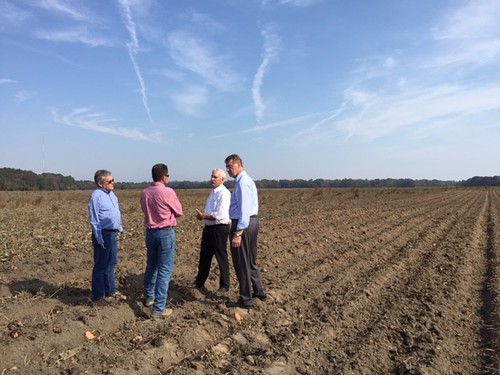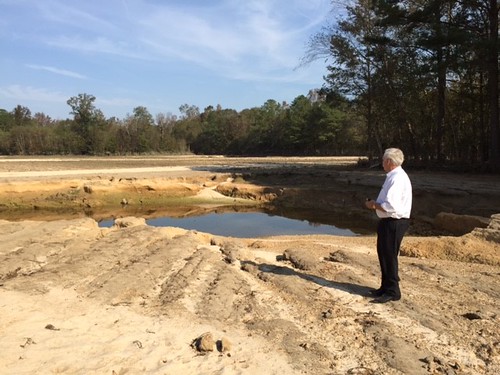
Under Secretary Michael Scuse, North Carolina FSA State Executive Director Bob Etheridge, and FSA County Executive Director Kenny Johnson stand with farmer Kent Smith to assess flood damage to his sweet potato crop in Tarboro, North Carolina.
When Hurricane Matthew hit last month, disaster struck as high flood waters devastated communities up and down the East Coast. Agricultural producers in Eastern North Carolina were hit especially hard and suffered devastating losses to crops, livestock, and property.
Secretary Vilsack recently designated 39 counties in North Carolina as primary natural disaster areas, in addition to 15 contiguous counties. This week, I traveled to the state to visit some of the communities that were affected. I saw a peanut farm littered with uprooted plants and cracked shells. I met with an organic tobacco producer whose top soil had completely washed away. I visited a sweet potato and soybean farm that suffered hundreds of thousands of dollars in losses. We drove by washed out roads and gutted homes with waterlogged furniture piled high on the side of the road.
It was heartbreaking to see the impact of the damage and the destruction of people’s lives. Now, three weeks after the storm, communities are starting to rebuild – and I want them to know that we are here to help. USDA has a wide range of programs available to those affected by natural disasters.
All qualified farm operators in disaster declared counties are eligible for low interest emergency loans. There are also many safety-net programs to help producers recover from eligible losses, including the Livestock Indemnity Program, the Emergency Assistance for Livestock, Honeybees, and Farm-Raised Fish Program, Emergency Forest Restoration Program and the Tree Assistance Program.
Producers with crops insured under the Federal crop insurance program should immediately contact their local crop insurance agent to report any damage to insured crops. Compensation also is available to producers who purchased coverage through the Noninsured Crop Disaster Assistance Program, which protects non-insurable crops against natural disasters.
Additionally, USDA helps communities rebuild through rural housing programs, distributing food safety information, and ensuring food security by distributing food and administering the Disaster Supplemental Nutrition Assistance Program. There are USDA Service Centers located all across the state to help producers with agricultural damage and support communities as they recover.
As a farmer myself, I know weather poses significant risks to our family and livelihood. What Eastern North Carolina has experienced is any farmer’s worst nightmare. I empathize with what they’ve been through and sincerely want them to know that USDA is here to help them recover and thrive once again.

Under Secretary Michael Scuse visits a washout on an organic farm caused by Hurricane Matthew.
No comments:
Post a Comment
Note: Only a member of this blog may post a comment.